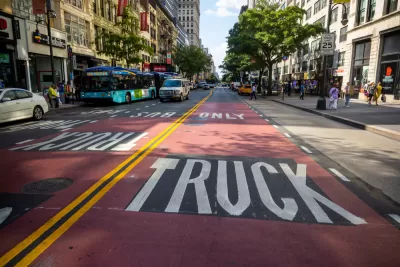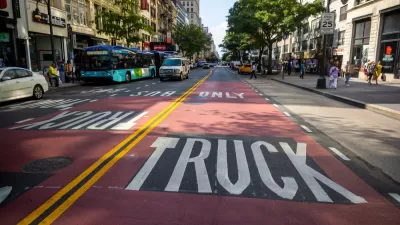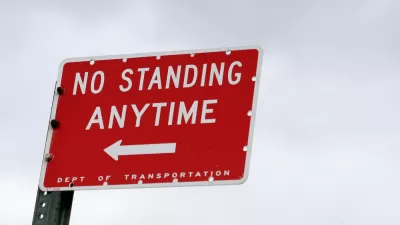Predictions of carmageddon have not come to pass after New York City blocked most car traffic of a section of 14th Street in Manhattan to make way for buses.

The initial reviews of the new bus priority on 14th Street in Manhattan were positive, but there was a sense that many writers in New York were waiting until the dust settled on an controversial and innovative new street configuration that made its debut on October 3, 2019.
An article written by Gina Bellafante for the New York Times and published over the weekend takes a more definitive stance: 14th Street is a huge success that should be duplicated elsewhere in the city.
Recently, I wandered around the vicinity of 14th Street and encountered a quiet that was almost eerie. I was unnervingly reminded of the days after 9/11, when cars were prohibited from making their way downtown. No one going to Cafe Cluny (on the corner of West 12th and West Fourth Streets) would have heard a single honking horn.
The relative silence was the result of the city’s recent decision to ban most cars from 14th Street. As transportation analysts had predicted all along, traffic doesn’t necessarily reroute itself when cars are pulled off certain roads. It almost starts to disappear.
The project is notable because it was delayed by lawsuits that predicted just the opposite scenario on streets in the vicinity of 14th Street would come true.
Bellafante also notes that side streets aren't the only beneficiary of the new arrangement. 14th Street itself is also transformed:
Initial data indicate that the buses, previously some of the slowest in the city but now, free of so much competition, have become much faster. An M14 bus trip that typically took 30 minutes now is taking about 21 minutes. One morning this week, a bus was so ahead of schedule that it had to stop at an intersection and pass the time so it wouldn’t get too ahead of itself.
Bellafante is also willing to test the waters on the idea of expanding the pilot project to more streets. "Imagine 42nd Street without traffic," for instance.
FULL STORY: Cars Were Banned on 14th Street. The Apocalypse Did Not Come.

Maui's Vacation Rental Debate Turns Ugly
Verbal attacks, misinformation campaigns and fistfights plague a high-stakes debate to convert thousands of vacation rentals into long-term housing.

Planetizen Federal Action Tracker
A weekly monitor of how Trump’s orders and actions are impacting planners and planning in America.

Chicago’s Ghost Rails
Just beneath the surface of the modern city lie the remnants of its expansive early 20th-century streetcar system.

Bend, Oregon Zoning Reforms Prioritize Small-Scale Housing
The city altered its zoning code to allow multi-family housing and eliminated parking mandates citywide.

Amtrak Cutting Jobs, Funding to High-Speed Rail
The agency plans to cut 10 percent of its workforce and has confirmed it will not fund new high-speed rail projects.

LA Denies Basic Services to Unhoused Residents
The city has repeatedly failed to respond to requests for trash pickup at encampment sites, and eliminated a program that provided mobile showers and toilets.
Urban Design for Planners 1: Software Tools
This six-course series explores essential urban design concepts using open source software and equips planners with the tools they need to participate fully in the urban design process.
Planning for Universal Design
Learn the tools for implementing Universal Design in planning regulations.
planning NEXT
Appalachian Highlands Housing Partners
Mpact (founded as Rail~Volution)
City of Camden Redevelopment Agency
City of Astoria
City of Portland
City of Laramie





























